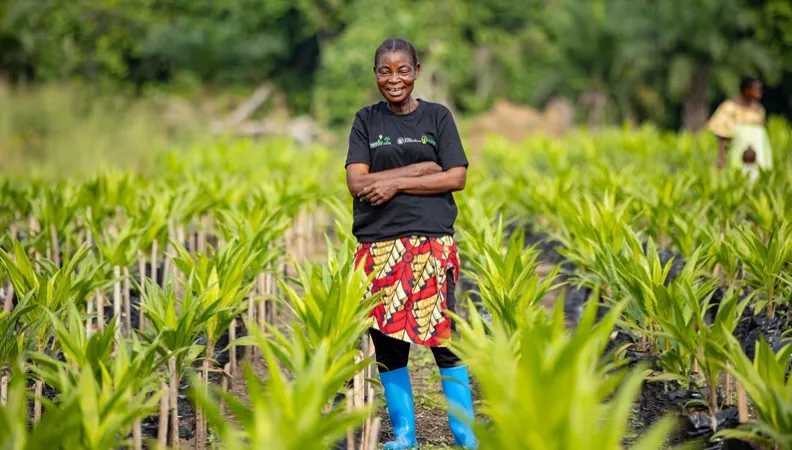Share the page
The Democratic Republic of Congo: Developing family farming without damaging primary forests
Published on

Expertise in forest protection is one of the key strategies highlighted by AFD at COP30 in Belém, Brazil. This approach is exemplified by the Support Program for the Sustainable Development of Savannah and Degraded Forest Areas (PSFD), implemented in the Democratic Republic of Congo (DRC), home to one of the last remaining primary forests in Africa.
In 2022, the Democratic Republic of Congo (DRC) lost over half a million hectares of forest, and the rate of loss has continued to increase slightly in recent years. Agriculture is one of the main sources of income in Bambae, in the country's Banalia territory. However, the growth of this sector has come at the expense of forests on which communities' livelihoods depend.
"Through my involvement in the PSFD, I get very high-quality cocoa seedlings that I couldn't really afford before," says Ismaël Djemba, farmer and beneficiary of the PSFD project in Tshopo province. "Thanks to this productive alliance between farmers and the processing company, I can also grow corn without putting the forest at risk. This helps support my business model today. As a result, I have even been able to build a house, send my children to school, and pay their school fees."
The PSFD program aims to replicate these results on a widespread scale, with $15 million (€12.9 million) in financing from the Democratic Republic of Congo’s National REDD+ Fund (FONAREDD) and the Central African Forest Initiative (CAFI). AFD is implementing this project through a delegation of funds.
Supporting farmers and small businesses
This program supports farmers and small rural business owners who work every day to earn a living from their land. By providing them with the resources they need to adopt less invasive agricultural practices, it supports the development of local agricultural value chains, thus reducing poverty and supporting family farms that feed communities. These measures help to restore degraded savanna and forest areas, limit deforestation, and mitigate the effects of climate change.
Twenty-five productive alliances have now been established between processing companies and small sustainable producers of cocoa, coffee, and palm oil. This system provides security for families and encourages them to settle on the land of beneficiary farms, thus limiting deforestation.
"Before, we had to cut down trees in order to plant crops. With these new methods, we can now protect the environment while earning a living," says another farmer from Banalia.
An innovative approach
The PSFD has achieved tangible results in Tshopo province, supporting nearly 5,500 farmers to set up production and maintain their crops, planting 6,600 hectares of cash crops, and implementing 11 innovative projects to promote the adoption of new agricultural practices suited to local conditions.
"This innovative approach is based on the principle of Payment for Ecosystem Services (PES). This involves granting subsidies to producers according to their results in the field, including plantations, the number of hectares cultivated, and maintenance, while preventing deforestation," says Floriane Pomares, Agriculture and Forestry Project Manager at AFD. "This system is now proving its worth on the ground: it promotes sustainable agricultural practices and really improves the living conditions of sustainable producers, like Ismaël."
In Bambae and throughout the Tshopo province, this change in farming practices is tangible proof that the destruction of the world's second-largest forest carbon sink can still be prevented.
